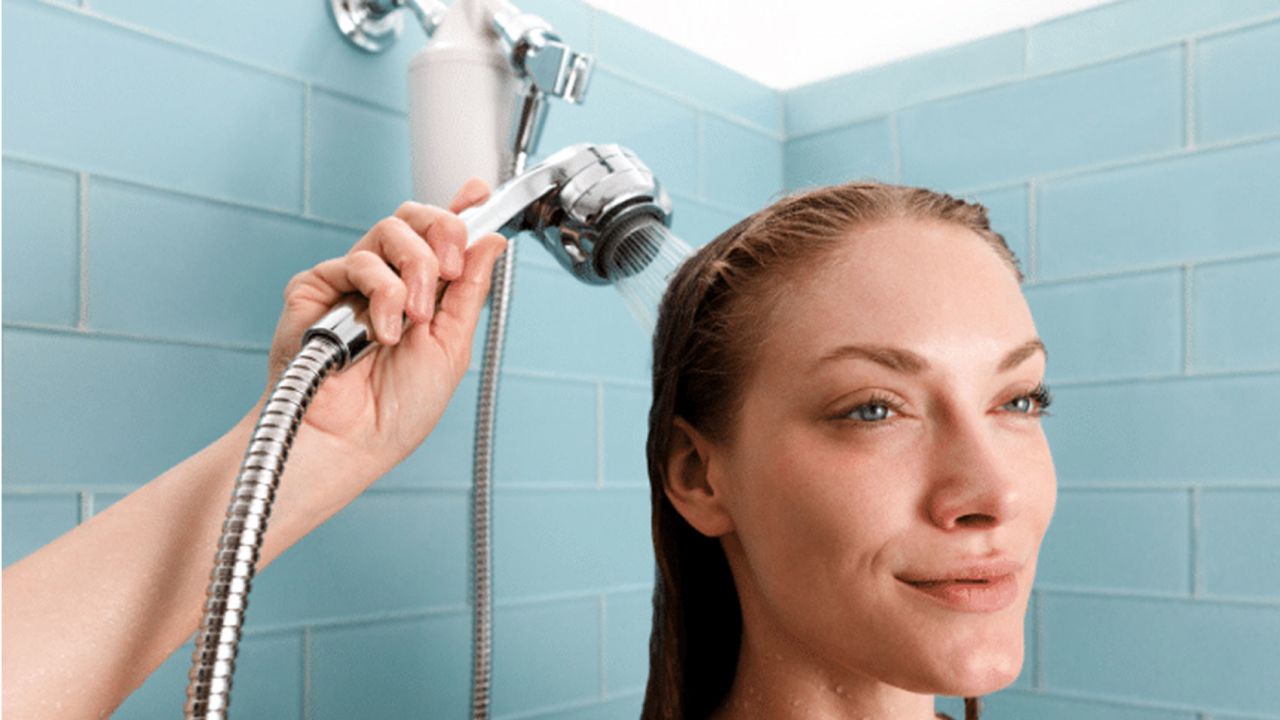Hair loss from hard water in your shower can be a frustrating and distressing issue. Many people are unaware that the water they use to wash their hair can significantly impact their hair’s health. In this blog post-Tips to Prevent Hair Loss from Hard Water in Your Daily Routine Shower, we will discuss the connection between hard water and hair loss, as well as tips to prevent hair loss from hard water in your daily routine shower. We will also explore whether hair loss due to hard water is reversible and the steps you can take to address this issue.
Understanding Hard Water and Hair Loss

Hard water is water that has a high mineral content, primarily calcium, and magnesium. This mineral content can cause several hard water hair symptoms, such as dryness, breakage, and hair loss. The reason behind this is that the minerals in hard water can build up on the hair shaft, making it more difficult for moisture and nutrients to penetrate the hair.
Many people wonder, “Can shower water cause hair loss?” The answer is yes, especially if you live in an area with hard water. Hard water can weaken your hair, leading to breakage and hair loss. The question then becomes, “How much is too much hair loss in the shower?” While it’s normal to lose some hair during washing, you should be concerned if you notice an increase in hair loss or if you lose more than 100 hairs per shower.
Identifying the Signs of Hard Water Hair Damage

To determine if hard water is affecting your hair, look for these common hard water hair symptoms:
- Dry, dull, and lifeless hair
- Hair that is difficult to detangle and prone to breakage
- An itchy, irritated scalp
- A buildup of minerals on the hair shaft results in a filmy, rough texture
If you’re experiencing these symptoms, it’s essential to take action to protect your hair from further damage.
Tips for Preventing Hair Loss from Hard Water in Your Shower

Now that you understand the connection between shower water and hair loss, here are some tips to help you prevent hair loss from hard water in your daily routine shower:
- Install a shower water filter: One of the most effective ways to address shower water hair loss is to install a showerhead filter. These filters can remove minerals and impurities from your water, reducing the risk of hair damage and loss.
- Use a clarifying shampoo: A clarifying shampoo can help remove mineral buildup from your hair. Be sure to use this type of shampoo once a week or as needed, depending on the severity of your hard water hair symptoms.
- Condition your hair regularly: Hard water can strip your hair of its natural oils, leaving it dry and more prone to breakage. To counteract this, use a moisturizing conditioner after every shampoo. Additionally, consider using a deep conditioning treatment once a week.
- Limit heat styling: Since hard water can weaken your hair, it’s essential to minimize heat styling to prevent further damage. When you do use heat tools, be sure to use a heat protectant to shield your hair from high temperatures.
- Rinse with distilled water or a vinegar solution: After washing and conditioning your hair, you can rinse with distilled water or a diluted vinegar solution (one part vinegar to four parts water) to help remove mineral buildup and restore your hair’s natural pH balance.
Is Hair Loss from Hard Water Reversible?

Many people ask, “Can you reverse hair loss from hard water?” The good news is that hair loss caused by hard water can often be reversed. By taking the steps mentioned above to protect your
hair and address the underlying issue, you should see an improvement in your hair’s health and a decrease in hair loss.
Suppose you’re still experiencing hair loss after implementing these changes. In that case, it’s essential to consult with a medical professional or a trichologist, as there could be other underlying causes for your hair loss.
Monitoring Your Hair’s Health

To determine if your efforts to prevent hair loss from hard water are working, keep an eye on your hair’s overall health. Here are some indicators that your hair is recovering:
- Reduced hair breakage and shedding
- Improved hair texture and manageability
- Increased shine and moisture
- A healthier, less irritated scalp
Remember that hair growth and recovery can take time. Be patient and give your hair the care it needs to bounce back from the damage caused by hard water.
When to Seek Professional Help

If you’ve tried the tips outlined in this article and are still experiencing significant hair loss, it’s crucial to consult with a medical professional, dermatologist, or trichologist. They can help identify any underlying health conditions that could be contributing to your hair loss and recommend appropriate treatment options.
In some cases, your hair loss may be related to factors beyond hard water, such as hormonal imbalances, nutritional deficiencies, or certain medications. By addressing these issues, you can promote healthier hair growth and minimize hair loss.
Conclusion
Hair loss from hard water in your shower can be a frustrating issue, but with the right steps, it’s possible to protect your hair and prevent further damage. By installing a shower filter, using clarifying and moisturizing hair products, limiting heat styling, and rinsing with distilled water or a vinegar solution, you can combat the negative effects of hard water on your hair.
Remember to be patient and give your hair time to recover, and don’t hesitate to seek professional help if your hair loss persists. With proper care and attention, you can enjoy healthier, stronger hair, even if you live in an area with hard water.
